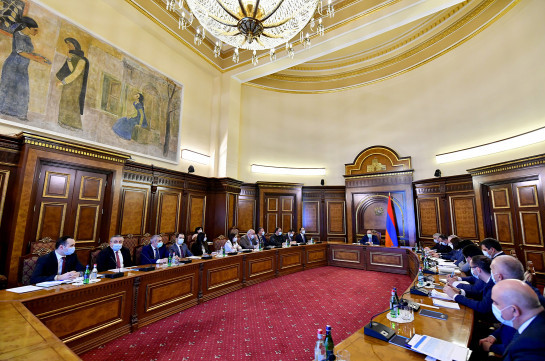
29/03/2021 17:41
Armenian Government set to tighten COVID-19 response measures
Prime Minister Nikol Pashinyan chaired a meeting of the Commission on Coordination of COVID-19 Response Action in the Republic of Armenia.
Addressing those present, Prime Minister Pashinyan stated, in part: “Our forecast that the pandemic could last at least a year has come true, and the coronavirus is still spreading all over the world. A new circumstance has emerged - the use of vaccines, and today we will discuss the current situation and the steps to take ahead as regards the vaccination policy, the contracts on the purchase of vaccines, and further action.”
Healthcare Minister Anahit Avanesyan reported on the epidemiological situation in Armenia, noting that to date 190,741 cases of coronavirus infection have been confirmed in our country; 172,096 patients have recovered, while 3,476 cases were fatal. 14,287 patients are under treatment at this point of time and a total of 842,817 tests have so far been carried out.
Statistical data were presented concerning the reproducibility of infection, increase in morbidity and hospital ward availability. The Minister pointed out that the past 7 days’ statistics is a cause for concern; the epidemiological situation remains tense and may worsen if the preventive action is not tightened.
Minister Avanesyan next referred to the procurement of vaccines against Covid-19. She advised that on March 28 the first batch of vaccines - 24 thousand doses – was imported to Armenia. This first batch is intended for voluntary vaccination against coronavirus among representatives of risk groups. The data on the efficacy and safety of the imported vaccine meet the standards set by the World Health Organization. Work is underway to purchase the next batch of Covid-19 vaccine.
Priority measures to prevent the spread of coronavirus were discussed during the meeting. The Prime Minister suggested organizing work along the following lines: continued vaccination, mandatory wearing of masks, tighter control measures and improved hospital capacity. A number of proposals were voiced, including the purchase of other types of vaccines.
Issues related to preventive measures in general educational institutions were discussed. The speakers stressed that the proposed action should take note of the principles and experience gained during the previous crisis stages. The Premier instructed those in charge to strengthen inspections, especially in closed areas and in public transport, raise the public’s awareness of the mask wearing culture and focus on the procurement of new vaccine batches.








